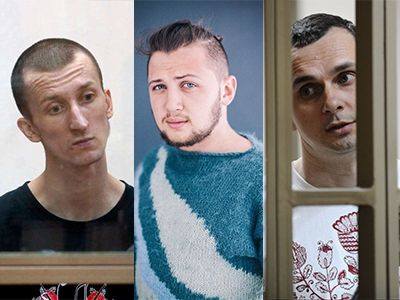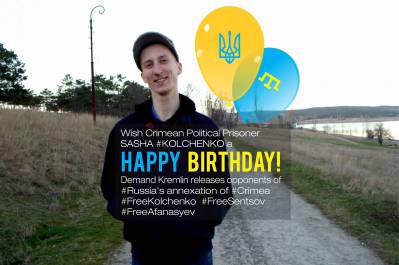Russia’s Ideologically Motivated State Terror and Its Ukrainian Victims

ADDRESSES TO WRITE TO OLEKSANDR KOLCHENKO ON HIS BIRTHDAY & THE OTHERS AT THE BOTTOM
Russia’s Supreme Court is due on Nov 24 to hear appeals against the 20- and 10-year sentences passed on two Ukrainians – renowned filmmaker Oleg Sentsov and civic activist Oleksandr Kolchenko. The same court has already refused to reconsider the 7-year sentence passed on Gennady Afanasyev, the third of four Ukrainians who opposed Russia’s annexation of Crimea and were tried as ‘terrorists’ in a case which Russian human rights defenders have called “ideologically-motivated state terror”. Afanasyev is now in serious danger for having retracted his earlier testimony against Sentsov, and Russia is openly ignoring its obligation under the Minsk Protocol to release the four men and all other Ukrainians illegally held in Russia.
In a world facing grave danger from terrorism, this politically motivated prosecution of four Ukrainian opponents of annexation on charges of ‘terrorism’ seems particularly cynical. In recognizing Afanasyev, Kolchenko and Sentsov as political prisoners, the respected Memorial Human Rights Centre has demonstrated the lack of any substance to the charges. Not one of the four can be accused of more than acts of protest against those who had seized control of their native Crimea, and there is quite simply nothing against Sentsov at all, although it is he whom a Russian court has sentenced to 20 years imprisonment.
After forcibly annexing Crimea, and despite strong opposition from all four men who have categorically rejected Russian citizenship, Russia has rejected this and sentenced them as though they were Russian nationals.
Alexander Popkov has been representing Afanasyev since the latter not only refused to testify in the trial of Sentsov and Kolchenko, but also stated that his previous testimony against the men had been obtained through torture. Popkov believes that the speed with which Russia’s Supreme Court rejected Afanasyev’s cassation appeal suggests that a political decision has been taken to steer clear of a case which would be ‘inconvenient’ for the Russian authorities.
There are no grounds for optimism about Sentsov and Kolchenko’s appeal hearing on Nov 24.
All four men were arrested in May 2014, and held incommunicado for weeks before being taken to Russia, when on May 30 the FSB or Russian Security Service claimed that they had been involved in a ‘Right Sector terrorist plot’. There was nothing to indicate any presence of the ultra-nationalist Right Sector in Crimea, and the idea that Kolchenko, who is a committed left-wing anarchist would have taken part in a far-right movement’s ‘plot’ was absurd.
Sentsov and Kolchenko denied all charges from the outset and spoke consistently of having been tortured to force ‘confessions’ out of them. Sentsov, who is older, an internationally renowned film director as well as an Automaidan activist, was told that if he didn’t give the testimony they demanded, they would make him the ‘mastermind’ of their fictitious plot and he would die in Russian captivity.
Sentsov was sentenced to 20 years on Aug 25, Kolchenko to 10 years after a trial where it became clear from the first day that the prosecution had absolutely nothing against the men. The Memorial Human Rights Centre issued a statement in which it condemned the trial and recognized Sentsov and Kolchenko as political prisoners.
The case entirely hinged on the two ‘confessions’. For (initially) agreeing to ‘cooperate’ with the investigators, both Afanasyev and Chirniy were tried separately and received the minimum – 7-year - sentence for ‘terrorism’. Afanasyev did take part in two firebomb incidents against the empty premises of organizations directly helping Russia’s seizure of control in Crimea, while Kolchenko was involved in one. Memorial has examined the charges and points out that they in no way constitute terrorism, and that similar offences in Russia have been classified as hooliganism and resulted in significantly shorter sentences. On Aug 19, Memorial declared Afanasyev a political prisoner and specifically warned that he was in danger.
Despite the lack of any evidence, Afanasyev’s retraction of his testimony and his description, both of the earlier torture and the pressure he had been put under before appearing in the courtroom, prosecutor Igor Tkachenko demanded and Rostov Military Court Sergei Mikhailyuk, Viacheslav Korsakov and Edward Korobenko handed down unprecedentedly harsh sentences against Sentsov and Kolchenko.
At present Sentsov and Kolchenko are in a remand prison in Rostov on the Don where Oleksandr Kolchenko will on Nov 26 be spending his second – 26th – birthday in Russian detention (see below). Kolchenko’s lawyer Svetlana Sidorkina travelled to Rostov on Thursday to visit her client and was prevented from seeing him. The claim made – that there were no free offices – cannot be an excuse for preventing a person from seeing his lawyer, especially when the Russian authorities are deliberately holding all men far from their native Crimea.
Russia’s response thus far to demands from the Parliamentary Assembly of the Council of Europe [PACE], European Parliament and all democratic countries for Sentsov and Kolchenko’s release have resulted only in a further absurd charge being laid against Sentsov.
The treatment meted on Afanasyev since his court appearance and the Supreme Court’s refusal to review the case give very real grounds for concern. He has, as threatened, been sent to a prison colony in the far north of Russia [the Republic of Komi] with extremely harsh conditions. In the space of just over a month, he has faced four punishments for fabricated misdemeanours and Popkov warns that the situation is likely to get worse.
Popkov believes that it is vital that Ukraine demands its citizens’ extradition. In order for such demands to be heeded, it is imperative that PACE, the European Parliament and other international bodies and countries clearly state that all four men are illegally held and must be returned to Ukraine. Please add your voice to the petition here.
 Image: Rustem Irsay
Image: Rustem Irsay
As mentioned, it is Oleksandr Kolchenko’s BIRTHDAY on Nov 26. It is bleak spending your birthday in Russian captivity facing a monstrous sentence on trumped up charges. Please send him birthday greetings (and sign the petition demanding his release!).
The following birthday wishes would be fine.
С днём рождения! Желаю Вам крепкого здоровья, мужества и счастья. Надеюсь на скорое освобождение.
(Happy Birthday! Wishing you health, courage and happiness, and that you will soon be released.)
Oleksandr Kolchenko
344082, г. Ростов-на-Дону, ая 2710,
Кольченко Александру Александровичу (1989 г.р.)
OR, until Nov 23, send them to halyapuff[at]gmail.com
LETTERS to all three men are much needed! Messages in Russian are most likely to get through, though short messages in simple English may also. Even if they do not, they will still help by demonstrating to the prison administration in Gennady Afanasyev’s case, and to the Russian authorities, that the men are not forgotten and that Russia’s treatment of them is under scrutiny.
Gennady Afanasyev
167028, Республика Коми, г. Сыктывкар, п. Верхний Чов, ИК-25,
Афанасьеву, Геннадию Сергеевичу (1990 г.)
Oleg Sentsov
344082, г. Ростов-на-Дону, ая 2710,
Сенцову Олегу Геннадьевичу (1976 г.р.)
The addresses can be copy-pasted) – the numbers in brackets are each man’s year of birth, which is required for getting letters through:





